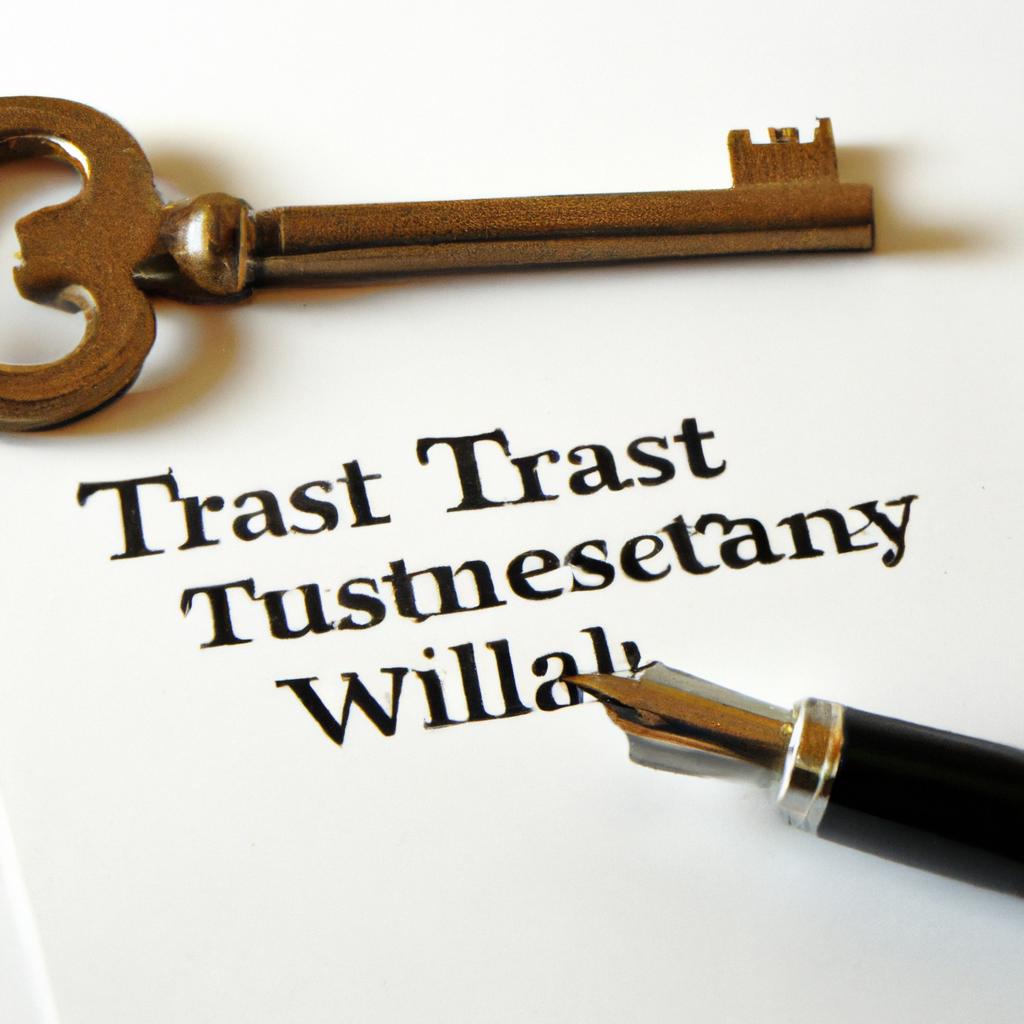As seasoned legal practitioners at Morgan Legal Group in the heart of New York City, we understand the intricacies of estate planning and the importance of safeguarding one’s assets for future generations. Among the various tools at our disposal, will trusts are a vital component of a comprehensive estate plan. In this article, we will delve into the intricacies of will trusts, exploring their benefits, complexities, and the crucial role they play in securing one’s legacy.
Understanding the Purpose of a Will Trust
Creating a Will Trust is a crucial aspect of estate planning that can provide peace of mind and ensure your assets are distributed according to your wishes. A Will Trust allows you to specify how your assets should be managed and distributed after your passing, giving you control over who will benefit from your estate. By setting up a Will Trust, you can protect your assets from being mismanaged or squandered and provide for your loved ones in a responsible and efficient manner.
One of the key purposes of a Will Trust is to minimize the impact of inheritance tax on your estate. By structuring your assets in a Will Trust, you can potentially reduce the amount of tax that your beneficiaries will have to pay, allowing them to receive a larger portion of your estate. Additionally, a Will Trust can protect your assets from creditors or ensure that your beneficiaries are provided for in case of divorce or other unforeseen circumstances. Overall, is essential for effective estate planning and ensuring that your wishes are carried out accordingly.

Benefits of Establishing a Will Trust
Establishing a will trust can provide numerous benefits for individuals seeking to secure their assets and provide for their loved ones after their passing. One major advantage of creating a will trust is the ability to avoid probate, a lengthy and costly legal process that can tie up assets for months or even years. By transferring assets to a trust, these assets can pass directly to beneficiaries without the need for probate, saving time and money for all involved.
Furthermore, a will trust can provide privacy for your estate by keeping your assets out of the public record. This can help protect your family’s financial information and avoid potential disputes among beneficiaries. Additionally, establishing a will trust allows you to control how and when your assets are distributed to beneficiaries, ensuring that your wishes are carried out according to your specific instructions.

Key Considerations When Creating a Will Trust
When setting up a will trust, there are several important considerations to keep in mind to ensure that your assets are properly protected and distributed according to your wishes. One of the key factors to consider is the selection of trustees who will be responsible for managing the trust. It is crucial to choose individuals who are trustworthy, competent, and reliable in handling financial matters.
Another important consideration is determining the beneficiaries of the trust and clearly outlining their entitlements. It is essential to specify the conditions under which the beneficiaries can access the trust funds, as well as any restrictions or limitations that may apply. Additionally, it is important to regularly review and update the terms of the trust to reflect any changes in your financial situation or family circumstances.

Guidelines for Choosing Trustees for a Will Trust
When selecting trustees for a will trust, it is essential to consider individuals who possess the necessary qualities to manage the trust effectively. Trustees play a crucial role in ensuring that the wishes of the grantor are carried out and that the assets are distributed according to the terms of the trust. Here are some guidelines to help you choose trustees for your will trust:
- Trustworthiness: Select individuals who are trustworthy and have a track record of acting with honesty and integrity.
- Financial acumen: Choose trustees who have a good understanding of financial matters and are capable of managing investments and assets wisely.
- Responsibility: Look for trustees who are responsible and reliable, as they will have to make important decisions on behalf of the trust.
- Communication skills: Opt for trustees who possess excellent communication skills, as they will need to effectively communicate with beneficiaries and other stakeholders.
By carefully considering these guidelines and choosing trustees who meet these criteria, you can help ensure that your will trust is managed in a professional and competent manner. If you need assistance with estate planning or setting up a will trust, our team at Morgan Legal Group in New York City is here to help.
Q&A
Q: What is a will trust?
A: A will trust is a legal arrangement where assets are held on behalf of beneficiaries, as outlined in a person’s will.
Q: How does a will trust work?
A: A will trust is created in a person’s will, dictating how assets should be managed and distributed after their death by a trustee.
Q: What are the benefits of setting up a will trust?
A: Setting up a will trust can help protect assets for future generations, minimize inheritance tax liabilities, and provide flexibility in how assets are distributed.
Q: Who can be a trustee of a will trust?
A: The trustee of a will trust is usually a trusted individual or professional entity that is responsible for managing and distributing the assets according to the terms of the trust.
Q: Can a will trust be contested?
A: While it is possible for a will trust to be contested, it is generally more difficult to challenge than a traditional will since the assets are held in a separate legal entity.
Wrapping Up
In conclusion, a will trust is a powerful tool that can provide security and peace of mind for your loved ones after you’re gone. By setting up a will trust, you can ensure that your assets are distributed according to your wishes and that your beneficiaries are taken care of in the way you envision. Whether you’re looking to protect your wealth, minimize taxes, or provide for future generations, a will trust can be a valuable addition to your estate planning strategy. So consider consulting with a professional to see if a will trust is right for you and start securing your legacy today.
 Will trusts, also known as living trusts or revocable trusts, are a legal tool that allows individuals to manage and distribute their assets during and after their lifetime. Unlike a will, which only goes into effect after the individual’s death, a will trust goes into effect immediately and can be altered or revoked at any time. This flexibility and control make will trusts an attractive option for individuals who want to ensure their assets are managed and distributed according to their wishes.
Will trusts, also known as living trusts or revocable trusts, are a legal tool that allows individuals to manage and distribute their assets during and after their lifetime. Unlike a will, which only goes into effect after the individual’s death, a will trust goes into effect immediately and can be altered or revoked at any time. This flexibility and control make will trusts an attractive option for individuals who want to ensure their assets are managed and distributed according to their wishes.
In this article, we will delve deeper into the concept of will trusts, its purpose and benefits, as well as practical tips for creating and managing one. So if you’re considering setting up a will trust or just want to learn more about it, keep reading!
What is a Will Trust?
In simple terms, a will trust is a legal arrangement in which a trustee holds an individual’s assets for the benefit of beneficiaries. The trustee is responsible for managing and distributing the assets in accordance with the individual’s wishes, as outlined in the trust agreement.
The trust agreement is a crucial component of a will trust, as it specifies the terms and conditions of the trust and outlines how the assets will be managed and distributed. It also identifies the beneficiaries and their share of the assets.
One of the main advantages of a will trust is that it allows assets to bypass the probate process, which is the legal process of administering an individual’s estate after their death. By avoiding probate, assets are distributed faster and more efficiently, with less chance of disputes or challenges from family members.
Benefits of a Will Trust
There are several benefits to setting up a will trust, including:
1. Avoiding probate fees: As mentioned earlier, a will trust allows assets to bypass the probate process, which can be costly. Probate fees are based on the total value of the estate and can add up quickly, especially if the estate includes valuable assets such as property or investments.
2. Maintaining privacy: Unlike a will, which becomes a public record after probate, a will trust remains private. This means that the details of your assets and beneficiaries will not be disclosed to the public.
3. Flexibility and control: A will trust can be altered or revoked at any time, giving individuals a level of control and flexibility that a will does not offer. This is especially beneficial for individuals who have complex or changing circumstances.
4. Protection of assets: A will trust can provide protection for assets, particularly from creditors or lawsuits. By keeping assets in a trust, they are shielded from potential legal obligations.
5. Easier to update: If an individual wishes to make changes to their will, they have to go through the entire process of creating a new will and revoking the old one. With a will trust, amendments can be made easily and without the need for legal intervention.
Practical Tips for Creating and Managing a Will Trust
Creating a will trust may seem like a complicated and overwhelming task, but with the right guidance and approach, it can be a relatively straightforward process. Here are some practical tips to keep in mind:
1. Consult a professional: It is highly recommended to seek legal and financial advice when setting up a will trust. A professional will have the necessary knowledge and experience to guide you through the process and ensure that your trust is valid and upholds your wishes.
2. Choose the right trustee: A trustee plays a crucial role in managing the trust and distributing assets to beneficiaries. It’s essential to choose someone who is trustworthy, responsible, and has a good understanding of your wishes.
3. Keep the trust properly funded: In order for a trust to be effective, it must be funded with assets. If an individual fails to transfer their assets into the trust, they will still be subject to probate.
4. Keep records up to date: It’s important to regularly review and update the trust documents as circumstances change, such as the birth of a child, marriage, or divorce. This ensures that the trust remains aligned with an individual’s wishes.
Case Studies and First-Hand Experiences
To provide further insight into the benefits and practicality of will trusts, here are two real-life scenarios of individuals who have utilized this legal tool:
1. Jane’s story: Jane was a single mother with two young children and substantial assets. She was concerned about the possibility of her assets being mismanaged or ending up in the wrong hands if something were to happen to her. Jane decided to set up a will trust to ensure that her children would be taken care of and that her assets would be managed according to her wishes. Years later, when Jane remarried, she was able to easily update her trust to accommodate her new family dynamic.
2. Mark’s story: Mark was a successful businessman with significant assets and a complex family situation. He had three children from his first marriage and a stepchild from his current marriage. Mark wanted to ensure that all his children were taken care of after his death, but also wanted to protect his assets from potential creditors. With the help of a professional, Mark set up a will trust that specified how his assets would be distributed and protected. This gave him peace of mind and allowed him to focus on his business without worrying about his family’s financial future.
In conclusion, a will trust can be a valuable legal tool for managing and distributing assets during and after an individual’s lifetime. It offers several benefits and flexibility, making it a popular option for those who want to ensure their assets are safeguarded and distributed according to their wishes. With the guidance of a professional and proper management, a will trust can provide individuals with peace of mind and protect their legacy for future generations.

